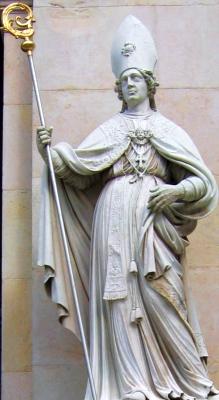Saint Virgilius of Salzburg
Saint

Feast Day: November 27
Saint Virgilius of Salzburg, also known as Fergal, Feargal, Fearghal, Ferghil, Vergil, Virgiel, and Virgil, was a Benedictine monk born in the 8th century in Ireland. He later became an influential figure in the Christian Church, particularly in Salzburg, Austria. At a young age, Virgilius embarked on a pilgrimage to the Holy Land in 743. On his way back home, he stopped in Bavaria and decided to settle there. It was in Bavaria that he met Saint Rupert of Salzburg, with whom he would later work closely. Virgilius became an abbot of Saint Peter's monastery in Salzburg. One of his notable disciples was Saint Modestus. His dedication and leadership skills soon caught the attention of Duke Odilo, who ordained him as the Bishop of Salzburg in 765. During his tenure as Bishop, Virgilius faced accusations of heresy by none other than Saint Boniface, a prominent figure in the Church at the time. These accusations were primarily based on Virgilius' scientific ideas, including his belief in a round earth. However, it is important to note that these accusations stemmed from tensions between the Roman and Celtic origins of the Christian faith rather than any actual heretical teachings. Virgilius was repeatedly cleared of the charges. Saint Virgilius's passion for the Church extended beyond his duties as a bishop. He worked diligently to rebuild the cathedral of Salzburg, leaving a lasting legacy of architectural beauty. Additionally, he sent missionary priests to Carinthia, Austria, spreading the teachings of the Catholic faith. Virgilius is often depicted in art as a bishop holding a church, a bishop with a purse, or a bishop with a globe, symbolizing his importance as a spiritual leader and his contributions to the Church. Saint Virgilius is widely venerated as the patron saint against birth complications. He is also the heavenly protector of Carinthia, Slovenia, Salzburg, Austria, and the Slovenes. Saint Virgilius passed away in 784 in Salzburg, Austria, from natural causes. His relics are enshrined in the altar of the cathedral of Salzburg, where he dedicated his efforts to its reconstruction. The Pope Gregory IX formally canonized him on June 10, 1233, as recognition of his holiness and the impact of his work in the Church.